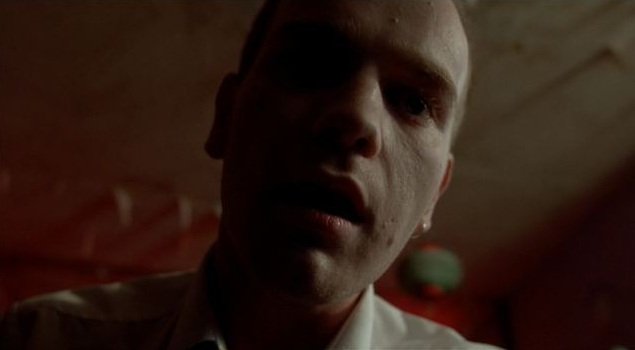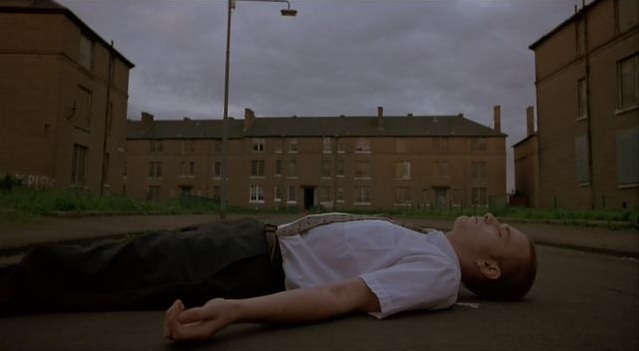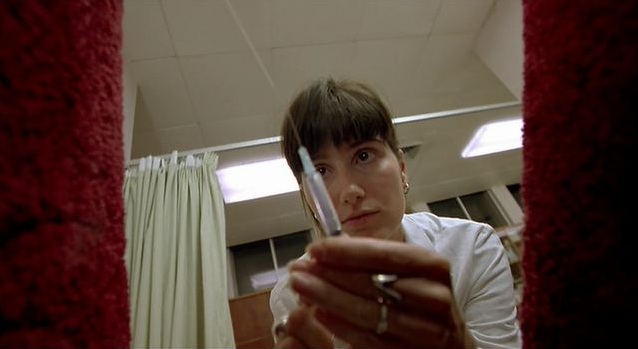 Andreas from Pussy Goes Grrr here, with the scene that served as my introduction to Lou Reed.
Andreas from Pussy Goes Grrr here, with the scene that served as my introduction to Lou Reed.
At his best, Danny Boyle knows how to mix memorable visuals, dynamic editing, and pop music into one striking, powerful package. The overdose scene in Trainspotting, his saga of Edinburgh heroin addicts, has all this and more set to the morose tune of Reed's "Perfect Day" (an ironic song title if there ever was one). Anti-hero Mark Renton, eager for "one fucking hit," returns to the desolate apartment of a sleazy dealer, where he shoots up... only to fall into a catatonic stupor, which Boyle represents by having him sink into a hole in the carpet, as if into a grave.
This is when Reed's flatly casual voice breaks in, singing the lyrics ("Just a perfect day, drink sangria in the park...") in a subdued tone that belies their supposed cheerfulness. As the dealer deposits Renton's immobile body on the street to wait for a taxi, Reed bursts into the chorus, and already the irony is palpable: clearly, Renton is having anything but a perfect day. But the irony goes far beyond that simple "happy song, sad scene" incongruity—because the song is self-contradictory to begin with, and the scene isn't merely sad.

Boyle's depiction of the overdose traffics in the same dark, sometimes satirical humor as the rest of Trainspotting, and it's shot in the same kinetic, self-conscious style. For example, the burgundy carpet, which blinkers Renton's POV shots while he's unconscious, functions as both a metaphor for his isolation in the depths of his overdose, and as a bleak visual joke. Similarly, the grim way he's passed along from dealer to cabbie to hospital orderlies borders on kafkaesque. This is no self-serious afterschool special; Boyle has an eye for the funny side of excessive drug use.
This clash between tragic subject matter and flashy style could come across as ridiculous or tasteless, but any such tonal ruffles are smoothed out by the faultless use of "Perfect Day." Despite occasional dips into ironic enthusiasm on one end and melancholy on the other, Reed's voice is stable throughout the song, almost to the point of monotone; this makes it the ideal song to accompany Renton's comatose journey to the emergency room. Even in its loudest, most climactic moments, "Perfect Day" is still as steady and patient as an elevator ride, and balances out the bounciness of Boyle's camera.

And throughout the scene, it offers a bittersweet lyrical counterpoint to Renton's current predicament, with the line "You just keep me hanging on..." ringing out just as the dealer shoves Renton into the back of the taxi, and the closing refrain, "You're going to reap just what you sow," as a dire reminder that he brought this miserable situation upon himself. It's also starkly appropriate that a song partially about self-delusion and ignoring one's problems should arrive in the center of a film about drug addicts.
According to rumor, "Perfect Day" is actually about heroin, and that may be case, but its usage here isn't just a matter of finding a song whose topic matches the film. (Had that been the case, Lou Reed wrote a song called "Heroin" that could've been used instead.) The scene derives much of its sticking power from the very precise interplay between the song's unique tone, the editing, and the camerawork, which together sustain a forlorn mood laced with many ironies. This seamless integration of visuals and music brings a light touch to the protagonist's near-death and rebirth, and forever entangles "Perfect Day" with the image of Ewan McGregor dying in a carpet.
 Saturday, May 7, 2011 at 6:41PM
Saturday, May 7, 2011 at 6:41PM Andreas from Pussy Goes Grrr here, to talk about one of the most infamously ironic song choices out there. And spoiler alert -- if you care about such things for 47 year old movies -- it's all about the ending.
 Dr. Strangelove,
Dr. Strangelove,  Mix Tape,
Mix Tape,  Peter Sellers,
Peter Sellers,  Stanley Kubrick
Stanley Kubrick 

